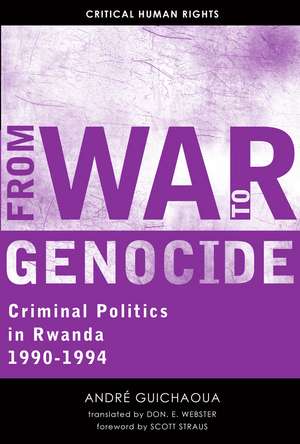From War to Genocide: Criminal Politics in Rwanda, 1990–1994: Critical Human Rights
Autor André Guichaoua Traducere de Don E. Webster Cuvânt înainte de Scott Straus Traducere de Don Websteren Limba Engleză Paperback – 26 iun 2017
In April 1994 Rwanda exploded in violence, with political, social, and economic divisions most visible along ethnic lines of the Hutu and Tutsi factions. The ensuing killings resulted in the deaths of as much as 20 percent of Rwanda's population. André Guichaoua, who was present as the genocide began, unfolds a complex story with multiple actors, including three major political parties that each encompassed a spectrum of positions, all reacting to and influencing a rapidly evolving situation. Economic polarities, famine-fueled privation, clientelism, corruption, north-south rivalries, and events in the neighboring nations of Burundi and Uganda all deepened ethnic tensions, allowing extremists to prevail over moderates.
Guichaoua draws on years of meticulous research to describe and analyze this history. He emphasizes that the same virulent controversies that fueled the conflict have often influenced judicial, political, and diplomatic responses to it, reproducing the partisan cleavages between the former belligerents and implicating state actors, international institutions, academics, and the media. Guichaoua insists upon the imperative of absolute intellectual independence in pursuing the truth about some of the gravest human rights violations of the twentieth century.
Guichaoua draws on years of meticulous research to describe and analyze this history. He emphasizes that the same virulent controversies that fueled the conflict have often influenced judicial, political, and diplomatic responses to it, reproducing the partisan cleavages between the former belligerents and implicating state actors, international institutions, academics, and the media. Guichaoua insists upon the imperative of absolute intellectual independence in pursuing the truth about some of the gravest human rights violations of the twentieth century.
Din seria Critical Human Rights
-
 Preț: 167.81 lei
Preț: 167.81 lei -
 Preț: 171.14 lei
Preț: 171.14 lei -
 Preț: 257.44 lei
Preț: 257.44 lei -
 Preț: 234.39 lei
Preț: 234.39 lei -
 Preț: 159.02 lei
Preț: 159.02 lei -
 Preț: 201.83 lei
Preț: 201.83 lei -
 Preț: 233.54 lei
Preț: 233.54 lei -
 Preț: 189.98 lei
Preț: 189.98 lei -
 Preț: 311.92 lei
Preț: 311.92 lei -
 Preț: 254.11 lei
Preț: 254.11 lei -
 Preț: 258.01 lei
Preț: 258.01 lei - 23%
 Preț: 473.27 lei
Preț: 473.27 lei -
 Preț: 179.28 lei
Preț: 179.28 lei -
 Preț: 176.61 lei
Preț: 176.61 lei -
 Preț: 177.37 lei
Preț: 177.37 lei -
 Preț: 235.78 lei
Preț: 235.78 lei - 23%
 Preț: 452.84 lei
Preț: 452.84 lei -
 Preț: 221.81 lei
Preț: 221.81 lei -
 Preț: 213.29 lei
Preț: 213.29 lei -
 Preț: 237.55 lei
Preț: 237.55 lei -
 Preț: 231.15 lei
Preț: 231.15 lei - 23%
 Preț: 472.22 lei
Preț: 472.22 lei -
 Preț: 180.25 lei
Preț: 180.25 lei -
 Preț: 510.83 lei
Preț: 510.83 lei - 23%
 Preț: 474.60 lei
Preț: 474.60 lei - 23%
 Preț: 473.72 lei
Preț: 473.72 lei - 23%
 Preț: 590.00 lei
Preț: 590.00 lei - 23%
 Preț: 477.70 lei
Preț: 477.70 lei - 23%
 Preț: 472.37 lei
Preț: 472.37 lei - 11%
 Preț: 230.06 lei
Preț: 230.06 lei - 13%
 Preț: 200.36 lei
Preț: 200.36 lei - 19%
 Preț: 437.91 lei
Preț: 437.91 lei
Preț: 225.80 lei
Nou
Puncte Express: 339
Preț estimativ în valută:
43.21€ • 45.20$ • 35.89£
43.21€ • 45.20$ • 35.89£
Carte tipărită la comandă
Livrare economică 02-16 aprilie
Preluare comenzi: 021 569.72.76
Specificații
ISBN-13: 9780299298241
ISBN-10: 0299298248
Pagini: 478
Ilustrații: 4 maps, 2 tables
Dimensiuni: 152 x 229 x 28 mm
Greutate: 0.64 kg
Editura: University of Wisconsin Press
Colecția University of Wisconsin Press
Seria Critical Human Rights
ISBN-10: 0299298248
Pagini: 478
Ilustrații: 4 maps, 2 tables
Dimensiuni: 152 x 229 x 28 mm
Greutate: 0.64 kg
Editura: University of Wisconsin Press
Colecția University of Wisconsin Press
Seria Critical Human Rights
Recenzii
"A landmark in the historiography of the Rwandan genocide. No serious scholar writing about the genocide can afford to ignore this trailblazing contribution."—René Lemarchand, author of The Dynamics of Violence in Central Africa
"Dispels myth after myth about the Rwandan genocide and Rwandan history." —Washington Post
"A definitive account from an accomplished researcher and a primary witness for the International Criminal Tribunal for Rwanda. The book is a comprehensive telling of the events leading to genocide and the evolution of genocidal policy by state actors." —Choice
Notă biografică
André Guichaoua is a professor of sociology, specializing in the African Great Lakes region, at the University of Paris 1 Pantheon-Sorbonne. He served as an expert witness on the Rwandan genocide before several courts and judicial bodies, including the International Criminal Tribunal for Rwanda of the United Nations. Don E. Webster is a former senior legal counsel and prosecutor for the United Nations International Criminal Tribunal for Rwanda, where he worked from 1999 to 2012.
Cuprins
Foreword
Scott Straus
Preface to the English Edition
Preface to the Original Edition
List of Abbreviations
Chronology
1. The Social and Political Context
2. The Refugee Question and the RPF's Choice of Armed Struggle
3. A Necessary Political Transition
4. The Arusha Negotiations and the Reconfiguration of Political Forces
5. Unspoken Terms in the Arusha Accords and Obstructions in the Political Transition
6. Competition for Control of the Militias
7. The Downing of the Presidential Plane on 6 April 1994 and the Military Crisis Committee
8. The Civilian Alternative
9. Installing the Interim Authorities
10. From Massacres to Genocide
11. The Interim Government at the Center of Power
12. War and the Fight for Supremacy
13. Truth and Justice: The "Struggle for Memory"
Conclusion
Postscript to the English Edition
List of Boxes
List of Annexes
Notes
Glossary
Index
Descriere
A definitive account and analysis of the evolving genocidal violence in Rwanda in 1994, and of the judicial, political, and diplomatic responses to it.
